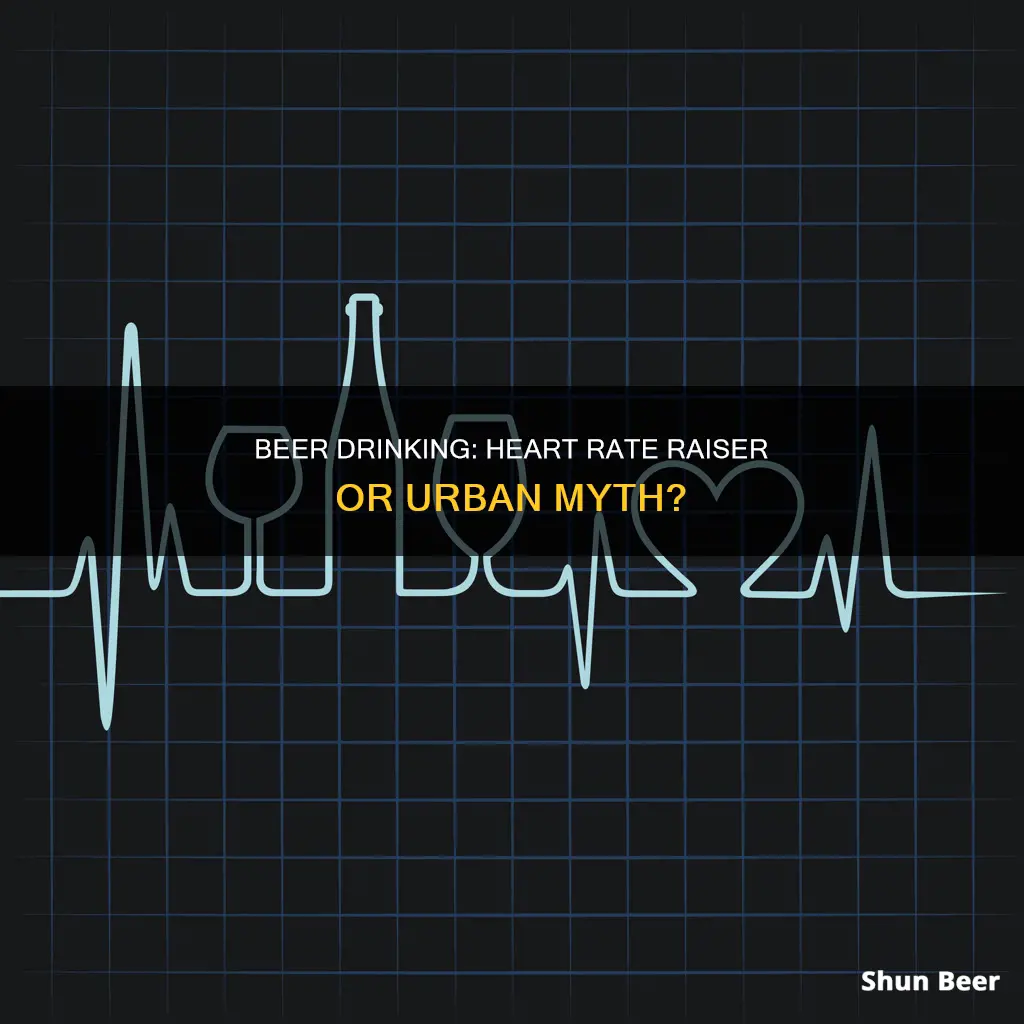
Alcohol has been shown to increase heart rate, with binge drinking linked to a phenomenon called holiday heart syndrome, which can cause an irregular heartbeat. Research has found that the more alcohol consumed, the higher the heart rate, with a study of Munich Oktoberfest attendees in 2015 finding that for more than 25% of participants, increasing breath alcohol concentrations were associated with sinus tachycardia greater than 100 beats per minute. While the link between alcohol and better heart health has not been definitively proven, heavy drinking has been shown to increase the risk of heart conditions such as atrial fibrillation, as well as other medical conditions.
| Characteristics | Values |
|---|---|
| Does drinking beer raise your heart rate? | Yes, drinking alcohol can lead to a temporary increase in heart rate. |
| How much alcohol is considered excessive? | Binge drinking is defined as consuming 4-5 or more drinks within 2 hours for women and 5 or more drinks within 2 hours for men. |
| What are the risks of excessive alcohol consumption? | Excessive alcohol consumption can lead to an irregular heartbeat, also known as arrhythmia or atrial fibrillation. It can also increase the risk of stroke, heart attack, and heart failure. |
| What are the signs that you should get your heart palpitations checked? | Specific danger signs include palpitations lasting longer than a minute or two, feeling lightheaded, shortness of breath, chest pain or discomfort, sweating, and passing out or feeling like you're going to. |
| What can you do to blunt the short-term effects of alcohol on your heart? | It is recommended to drink in moderation, drink fluids, and eat some food between drinks. |
What You'll Learn

Binge drinking and heart rate
Binge drinking is defined as consuming a certain amount of alcohol within a short period. For men, it is typically defined as drinking at least five drinks in the span of 2 hours, and for women, it is typically four drinks in the same time frame. Binge drinking has been linked to an increased risk of various cardiovascular issues, including an increased heart rate, also known as tachycardia.
The Holiday Heart Syndrome
The phenomenon of binge drinking leading to an irregular heartbeat was first observed in the 1970s and was termed the "Holiday Heart Syndrome" as binge drinking is more common during holidays, vacations, and social events. The link between binge drinking and arrhythmia has been strengthened by subsequent studies.
Studies on Binge Drinking and Heart Rate
A study of attendees at the Munich Oktoberfest in 2015 found that as the amount of alcohol consumed increased, so did heart rate. More than 25% of the participants experienced sinus tachycardia, with a heart rate greater than 100 beats per minute.
Another study found that binge drinking was associated with a higher risk of pre-hypertension and hypertension in both young adulthood and middle age. This is significant because systolic blood pressure is a strong predictor of future cardiovascular risk and outcomes.
Underlying Mechanisms
The exact mechanisms behind the link between binge drinking and increased heart rate are not yet fully understood. However, it is believed that alcohol may disrupt the heart's natural pacemaker, the electrical signals that keep the heart beating at the right pace. Alcohol may also create an imbalance between the sympathetic ("fight or flight") and parasympathetic ("rest and digest") nervous systems.
Recommendations
While moderate drinking may be debated in terms of its effects on heart health, heavy drinking is clearly linked to poor health outcomes, including heart conditions. Therefore, it is recommended to stick to moderate levels of drinking and not to overindulge.
Drinking 12 Beers Daily: How Long Can You Survive?
You may want to see also

Alcohol and atrial fibrillation
Drinking alcohol can increase your heart rate and make your heart beat faster. Research has shown that the more alcohol you consume, the higher your heart rate gets. Binge drinking, which is considered to be drinking at least five drinks for men and four drinks for women within a two-hour period, has been linked to atrial fibrillation, a phenomenon called "holiday heart syndrome".
Atrial fibrillation (AFib) is a condition where your heart beats really fast and out of rhythm. AFib can lead to blood clots, strokes, heart failure, and other heart conditions. Drinking alcohol every day can increase your chances of getting AFib. A recent study found a strong link between drinking one to three drinks per day, considered moderate drinking, and developing AFib. Heavy drinking, or more than three drinks per day, further increases the risk. The risk of AFib increases with every additional drink, and binge drinking also makes AFib more likely.
The Munich Beer Related Electrocardiogram Workup (MunichBREW) study, conducted during the 2015 Munich Oktoberfest, found that increasing breath alcohol concentration was associated with sinus tachycardia of more than 100 beats per minute in 25.9% of the participants. The researchers investigated the association between blood alcohol concentration and four ECG parameters: excitation (heart rate), conduction (PR interval, QRS complex), and repolarisation (QT interval). They found that increased heart rate was associated with higher breath alcohol concentration, confirming that alcohol consumption leads to a higher heart rate.
While the direct link between higher heart rate induced by alcohol and harm is not yet conclusive, it is plausible that the higher heart rate following alcohol consumption could lead to arrhythmias or atrial fibrillation. This is especially true for individuals who already have heart conditions, as they typically have a higher heart rate that can trigger arrhythmias.
For individuals who already have AFib, alcohol appears to have an almost immediate effect on their heart rhythm. A recent study found that a single drink doubled the odds of an AFib episode occurring within the next four hours. Another study found that moderate drinkers with AFib had more evidence of scarring and electrical signalling problems in their left atrium, one of the two upper chambers of the heart, compared to light drinkers and non-drinkers.
In summary, alcohol consumption, especially in excessive amounts, can increase the risk of atrial fibrillation. Binge drinking and heavy drinking are particularly harmful, but even small amounts of alcohol may negatively impact heart health. Therefore, avoiding alcohol or limiting consumption to occasional drinks on special occasions may be the safest approach to reduce the risk of AFib and other health threats associated with alcohol.
Beer and Lomotil: Is It Safe to Mix?
You may want to see also

Holiday heart syndrome
HHS is typically observed during weekends and holidays when people are more likely to binge drink. The risk of HHS is higher for those who already have heart issues, but anyone can develop this condition. HHS can lead to serious complications such as heart failure, blood clots, and strokes.
The symptoms of HHS are the same as those of AFib and include:
- Lack of energy and fatigue
- Chest discomfort or pain
- Dizziness or light-headedness
- Heart palpitations
- Shortness of breath or trouble breathing
If you experience any of these symptoms, it is recommended to seek medical attention, especially if they are severe or last for more than a few minutes. Treatment for HHS depends on the patient's overall health and the severity of symptoms. Doctors may suggest stopping alcohol consumption and, in some cases, may prescribe medications or perform cardioversion to restore a normal heart rhythm.
The best way to avoid HHS is to avoid binge drinking and maintain a healthy lifestyle, including regular physical activity and a balanced diet.
Beer Consumption: Blindness Risk and Visual Health
You may want to see also

Alcohol's effect on blood pressure
Alcohol has both acute and chronic effects on blood pressure.
Acute effects of alcohol on blood pressure
The acute effects of alcohol on blood pressure depend on the time after alcohol consumption and the amount of alcohol consumed. Low-dose alcohol consumption (less than 14 grams) within six hours does not affect blood pressure but does increase heart rate by 5.1 beats per minute. Medium-dose alcohol consumption (14 to 28 grams) within six hours decreases systolic and diastolic blood pressure and increases heart rate. However, medium-dose alcohol consumption does not affect blood pressure or heart rate seven to twelve hours after consumption. High-dose alcohol consumption (30 grams) within six hours decreases systolic and diastolic blood pressure and increases heart rate. High-dose alcohol consumption also decreases systolic and diastolic blood pressure seven to twelve hours after consumption. However, more than thirteen hours after consumption, high-dose alcohol consumption increases systolic and diastolic blood pressure and heart rate.
Chronic effects of alcohol on blood pressure
Chronic alcohol consumption is considered one of the most common causes of raised blood pressure. Heavy drinking, or more than three drinks per day, increases the risk of getting atrial fibrillation, a condition that makes the heart beat fast and out of rhythm. Binge drinking, or consuming more than five drinks in a row, also increases the likelihood of getting atrial fibrillation.
Beer and Naproxen: Is It Safe to Mix?
You may want to see also

Alcohol's long-term heart effects
Alcohol's effects on the heart are complex and multifaceted. While some studies have suggested that moderate alcohol consumption may be linked to a lower risk of heart disease and death, the overall impact of alcohol on heart health is not entirely beneficial. Here are some key points regarding the long-term effects of alcohol on the heart:
Increased Risk of Heart Problems
Heavy or excessive alcohol consumption is associated with an increased risk of heart conditions. This includes atrial fibrillation (AFib), a condition where the heart beats irregularly and rapidly, which can lead to blood clots, strokes, and heart failure. The risk of AFib increases with the amount of alcohol consumed, and binge drinking can also contribute to this condition.
Alcohol-Induced Cardiomyopathy
Long-term heavy alcohol use can lead to alcohol-induced cardiomyopathy, a condition where the heart changes shape due to stretching and enlargement of its muscles. This damage weakens the heart muscle, impairing its ability to pump blood effectively, which in turn reduces the body's oxygen supply. This condition can lead to severe problems, including heart failure, and may require medication or even surgery.
High Blood Pressure, Heart Failure, and Stroke
Heavy alcohol consumption is a contributing factor to high blood pressure, heart failure, and stroke. The negative impact of alcohol on heart health is not limited to direct effects on the heart muscle but also extends to the circulatory system.
Weight Gain and Obesity
Alcohol is a significant source of excess calories, and excessive consumption can lead to weight gain and obesity. This, in turn, can further increase the risk of heart-related problems as obesity is a well-known risk factor for cardiovascular disease.
Disruption of Heart Rhythm
Alcohol is known to disrupt the heart's natural pacemaker, interfering with the electrical signals that regulate the heart's rhythm. This disruption can lead to arrhythmias, or irregular heartbeats, which may have serious health consequences.
While the specific mechanisms are still being studied, the available evidence suggests that alcohol consumption, especially in excessive amounts, can have detrimental long-term effects on heart health. It is important to note that the key to minimizing these risks is moderation. Moderate alcohol consumption may not have the same level of negative impact, but excessive drinking can lead to significant heart-related problems.
Does Beer Go Bad After Being Opened?
You may want to see also
Frequently asked questions
Yes, drinking beer can cause an increase in heart rate.
The current Dietary Guidelines for Americans define "moderation" as no more than one to two drinks a day.
Binge drinking is defined as four or more drinks within two hours for women and five or more drinks within two hours for men.
Consistent binge drinking can lead to an irregular heartbeat, also known as arrhythmia or tachycardia, which can be harmful. It can also cause an increase in blood pressure and lead to heart failure or stroke.
If you experience a rapid heart rate after drinking, it is recommended to get it checked out by a doctor. Danger signs include palpitations lasting longer than a minute or two, feeling lightheaded, shortness of breath, chest pain or discomfort, sweating, and passing out or feeling like you are going to.







